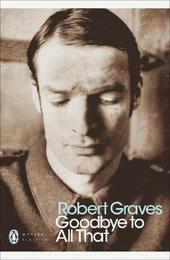
|
Goodbye to All That
Paperback / softback
Main Details
Description
In 1929 Robert Graves went to live abroad permanently, vowing 'never to make England my home again'. This is his superb account of his life up until that 'bitter leave-taking'- from his childhood and desperately unhappy school days at Charterhouse, to his time serving as a young officer in the First World War that was to haunt him throughout his life. It also contains memorable encounters with fellow writers and poets, including Siegfried Sassoon and Thomas Hardy, and covers his increasingly unhappy marriage to Nancy Nicholson. Goodbye to All That, with its vivid, harrowing descriptions of the Western Front, is a classic war document, and also has immense value as one of the most candid self-portraits of an artist ever written.
Author Biography
Robert Graves was born in 1895 in Wimbledon. He went from school to the First World War, where he became a captain in the Royal Welch Fusiliers and was seriously wounded at the Battle of the Somme. He wrote his autobiography, Goodbye to All That, in 1929, and it was soon established as a modern classic. He died on 7 December 1985 in Majorca, his home since 1929.
ReviewsA remarkable book ... Essential reading for the centenary of the first world war-Guardian One of the most candid self-portraits of a poet, warts and all, ever painted-The Times Literary Supplement We see the dark heart of the book even more clearly, and hear it beating even more loudly, in this original edition than we do in the comparatively careful and considered terms of the later one-Andrew Motion
|